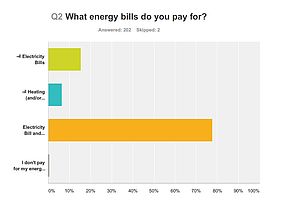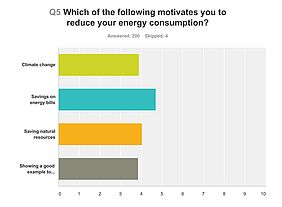The SECURE partners, through the project partner the Ecology Action Centre (Canada) have published the results of the community energy surveys taken place in Donegal and Leitrim (Ireland), Derry and Strabane (Northern Ireland, UK) and Nova Scotia (Canada).
The results of these surveys will be published through different news items that will inform about different aspects of the energy consumption.
According to the total numbers that EAC has received, 1/3 of people regularly track their energy consumption. However, in Nova Scotia about 4/5 of the respondents monitor their energy at least occasionally. In Derry and Strabane, more than half of the respondents regularly monitor their energy use. Regarding the energy bills that citizens pay for, a large majority (80%) of respondents pay for their energy, both electricity and heating. Of the 157 people who pay for both electricity and heating bills, 44 (28%) never check their homes energy consumption, 53 (34%) occasionally check their homes energy consumption and 60 (38%) do track their homes energy consumption. Of the 31 that pay for their electric bills only, 10 (32%) never check their energy consumption, 10 occasionally check their homes energy consumption, and 10 do track their homes energy consumption. Of the 13 that pay for heating only: 2 never check their bills, 8 occasionally check, and 3 do check.
Efficient setting for the season
In Donegal, Leitrim, and Derry and Strabane, just above 2/3rd of the survey respondents said that they do use the most efficient setting on their thermostat during all the seasons. For a good portion of the remaining, this is likely because they do not have a thermostat. 16% of persons who responded that they do set their thermostat to an appropriate setting do not check their energy use. 49% of those who do set it appropriately also responded that they track their energy use, while 35% occasionally check it. 54% of those who don’t know the most efficient setting also don’t track their energy consumption and 36% only occasionally check their energy use. This starts to show a trend of either lack of engagement or lack of education regarding energy issues. However, these respondents are engaged enough to take an entire survey about energy consumption!
When asking what do they do to save energy, the citizens have mostly mentioned the following ones:
- “I keep my windows and doors closed when the heating system is on”
- “I turn off my lights when they are not needed”
- “I keep radiators free of obstruction”
- “Reducing the electricity consumption by behaviour”
- “Insulating and air sealing home to reduce heat loss and draughts”
Motivations to reduce energy consumption
Between climate change, savings on energy bills, saving natural resources or showing good examples, the citizens have highlighted the following reasons by region:
Donegal: energy bills are by far the greatest motivator for people to save energy while climate change is the least motivating factor.
Leitrim: the most important factor is still energy bills, but the least important factor is setting a good example.
Derry and Strabane: it is lowering energy bills as well. Natural resources and climate change are almost exactly the same amount of motivation, with the exception that one person disagrees that climate change is a motivation.
Nova Scotia: energy bills are the most important factor for saving energy, and again Setting a good example is not a largely motivating factor.
Stay tuned for more results of these community energy surveys from the mentioned regions and more insights coming from Faroe Islands and North Karelia (Finland).




